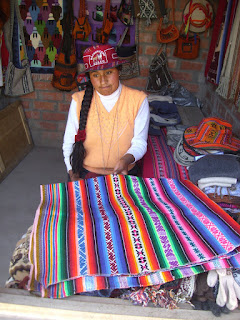1. Sunday's Election
I've got a meeting with the president of the artisan's association today and I'd like to get a sense of what positions people are most interested in running for and figure out if there will be any real competition for the positions. There are a dozen new positions and the association only has 60 members, so I'm hoping that every position gets filled by an enthusiastic artisan.
2. Getting "La Plata" (the money) for the Workshops
We've got a great designer, Pati, who's agreed to offer workshops for the artisans, and the city has offered to pay, but we need to work with her to write the agreement between the city and artisans' association. Once she writes her proposal, Mari - our coordinator in Lima - will edit it and I'll present it to the deputy mayor, hopefully on Thursday. Given the difficulty that Mari and I had tracking him down last week - when we had appointments - I'm just going to show up in the morning and wait him out.
3. Reaching out to Internet Retailers
New volunteer Melissa arrived yesterday and she'll begin reaching out to websites selling Peruvian handicrafts to give the artisans another sales channel. She's only initiating the process however since the artisans should be electing an internet sales manager this weekend. The goal is that she'll be able to train this person to take over in a month.
4. Teaching English Project
While we don't have enough volunteers now to have a full-time English teacher for the artisans, they have expressed an interest in learning English, so I'm going to put together a one-page Spanish-English vocab list of the most relevant words. I hope to find out what they are on Thursday.
5. Teaching Accounting
I need to take a closer look at any records the individual artisans have been keeping to get a sense of what kind of accounting would be most useful to them. They're not looking to raise money to grow their business at this point, and it's hard to imagine any of them reaching that level of success in the next two years, so I'm thinking financial accounting is not going to be as useful as managerial accounting. This is definitely going to test my business Spanish.
6. New Project: Improved Town Map
Conny - our Urubamba coordinator - recently stumbled across a city map. It's pretty obvious that a major problem the market has is location. It's not wildly out of the way. It's right next to the bus terminal, but on the opposite side of the all the restaurants. A map for tourists would be tremendously helpful. I'm no cartographer, so when Conny dropped of the map, I thought it would actually be possible for me to make a map including the market.


 Here we are at the end of the meeting, posing for a goodbye shot. (I've never felt so tall.)
Here we are at the end of the meeting, posing for a goodbye shot. (I've never felt so tall.)
































